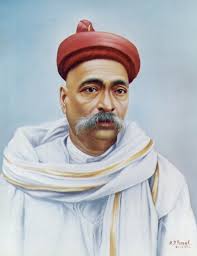Bal Gangadhar Tilak
Appearance
| Bal Gangadhar Tilak | |
|---|---|

| |
| Bal Gangadhar Tilak | |
| Born | 23 July 1856 |
| Birthplace | Ratnagiri, Bombay Presidency, British India (now Maharashtra, India) |
| Died | 01 August 1920 (aged 64) |
| Place of death | Bombay, British India (now Mumbai, India) |
| Resting place | Girgaum Chowpatty Crematorium, Mumbai |
| Nationality | Indian |
| Occupation | Freedom Fighter, Teacher, Lawyer, Journalist |
| Years active | 1879–1920 |
| Known for | Swaraj Movement, Home Rule League, Ganesh Utsav revival |
| Notable works | Kesari, The Arctic Home in the Vedas |
| Awards | Revered posthumously as the “Father of Indian Unrest” |
| Spouse(s) | Tapibai (Satyabhama) |
| Children | 3 |
| Parents | Gangadhar Tilak (father) |
| Religion | Hinduism |
| Website | |
Bal Gangadhar Tilak (23 July 1856 – 1 August 1920), popularly known as Lokmanya Tilak, was an Indian freedom fighter, lawyer, and journalist. He was one of the earliest and strongest advocates of Swaraj (self-rule) and is famously remembered for the slogan: Swaraj is my birthright and I shall have it.[1]
Early Life and Education
Bal Gangadhar Tilak was born in Ratnagiri in a traditional Marathi Brahmin family. He studied mathematics and Sanskrit at Deccan College in Pune and earned a law degree from Government Law College, Bombay.
Contributions
- Co-founded the Deccan Education Society in 1884 to promote modern and nationalistic education.
- Launched two nationalist newspapers: Kesari (Marathi) and Mahratta (English).
- Revived public celebrations of Ganesh Chaturthi and Shivaji Jayanti to promote unity and nationalism.
- Played a key role in the formation of the Home Rule League in 1916.
Political Ideology
- Prominent member of the radical or extremist wing of the Indian National Congress.
- Part of the famous Lal-Bal-Pal trio with Lala Lajpat Rai and Bipin Chandra Pal.
- Advocated assertive nationalism and believed in self-rule through Indian initiative.
Legacy
- Often referred to as the Father of Indian Unrest by the British authorities.
- Greatly influenced leaders like Mahatma Gandhi and Subhas Chandra Bose.
- His efforts laid the foundation for India's struggle for independence in the 20th century.
See Also
- Indian National Congress
- Swaraj
- Home Rule Movement
- Ganesh Chaturthi
- Lal-Bal-Pal
